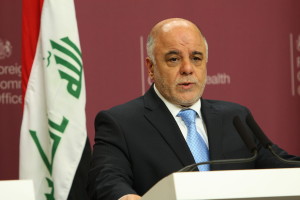Tensions Rise Among Key U.S. Allies in Fight Against ISIS
As sectarian violence rages in the Middle East, causing destruction and chaos, the Sunni-Shiite divide is widening in the region. The conflict is creating tension between the major powers involved in the area and among members of the U.S. led coalition against ISIS.

In a recent visit to Washington D.C., Iraqi Prime Minister Haider al-Abadi criticized Saudi Arabia’s involvement in Yemen, specifically denouncing the airstrikes against the Shiite Houthi tribes who have overthrown the government and are attempting to take control over the country.
The Prime Minister questioned the logic of the airstrikes and expressed fear that the Saudi involvement in Yemen would only exacerbate the current sectarian based conflict.
Saudi Arabia, a Sunni nation, is concerned over the Houthi rebellion, which is developing across its southern border in Yemen. The Houthi militias are a Shiite movement, widely considered to be a proxy force of the Iranian regime, also a Shiite country. Saudi Arabia and Iran are two of the major powers competing for influence in the region. However, they are not in direct conflict with each other, although both are involved in the fight against ISIS, a Sunni group.
Adel al-Jubeir, the Saudi ambassador to Washington, responded to Abadi’s criticism by saying that Iraq should concern itself with “what is going on in their own country.”
The increasing tensions between Iraq and Saudi Arabia occurred as both countries were increasing diplomatic engagement. The Saudi government recently appointed an ambassador to Iraq, a role that has not been filled for about to 25 years.
Abadi’s visit to Washington was the first time he travelled to the U.S. in his role as Prime Minister of Iraq. He met with President Obama and with other members of the government, requesting additional funding and support in the fight against ISIS. After the meetings, both President Obama and National Security spokesman Alistair Baskey reaffirmed their support for Saudi Arabia.
At the center of the controversy is the role of Iran in the conflict in Yemen, a role that is viewed very differently by Iraq and Saudi Arabia. The Saudis believe that Iran is seeking to gain greater influence in the region by supporting the Houthi tribes. For its part, Iraq does not believe there are any connections between Iran and the Yemeni uprising.
“The problem with Yemen is within Yemen,” the Iraqi prime minister said. “And here comes Saudi Arabia, intervening and bombing in Yemen and trying to destroy the capability of Yemen. We don’t know what the Saudis want to do after this. To build a region of power where they will intervene in any place they want? Is Iraq within their radar?”
Both the Saudi and Iraqi government wish to find a solution to the war in Yemen but they differ in how they envision those results will be achieved.
The Iraqi ambassador to Washington explained in an email: “Regarding Yemen, it is the position of Iraq that the conflict should end as soon as possible, and that the mechanism for ending the conflict should be a political solution endorsed by the people of Yemen.”
Saudi Ambassador Jubeir on his side relayed the words of King Salman who declared: “this operation will continue until the objective is achieved. There can be no half measures, and there will be no half measures.”
These divisions along sectarian lines are making it difficult for the Obama administration to fulfill its objectives of defeating ISIS. The tensions between Iraq and Saudi Arabia are a reflection of the problematic involvement of Iran in the region. The U.S. and some of its allies are worried that the Shiite militias backed by Iran in Iraq and Yemen may put the stability of the region at risk.
The situation may not be as bad as it seems and Abadi decided to play down his comments the following day, saying: “My intention is not to criticize anybody.” He added: “We are all in the same boat in the region and if anyone makes a hole in that boat, we all will sink.”
President Obama has yet to comment on the controversy. He must tread a fine line between risking U.S. alliances in the region and letting tensions develop between the major regional powers involved in the conflict. Obama must also contemplate the implications of the involvement of Iran-backed forces in Iraq, an involvement that has accomplished decisive results in gaining territory back from ISIS.
